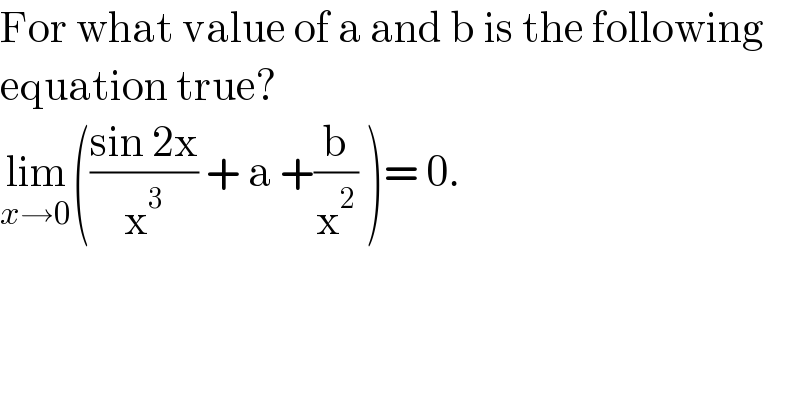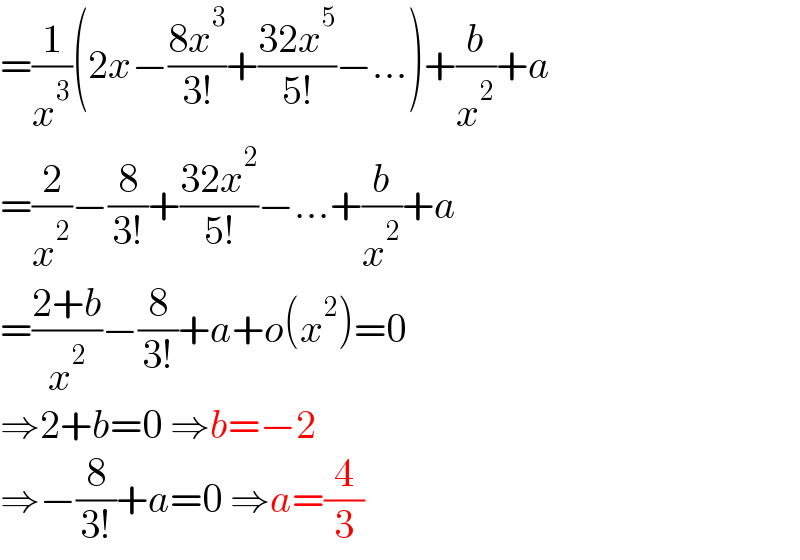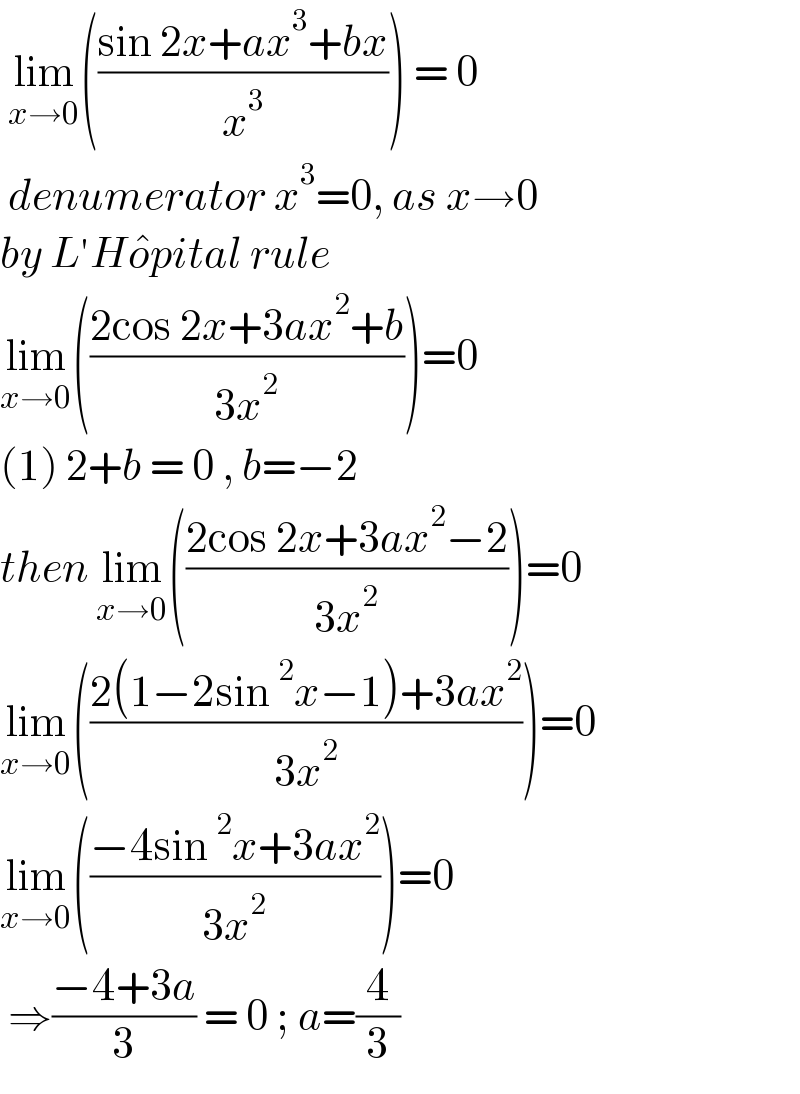Question Number 130596 by bramlexs22 last updated on 27/Jan/21

$$\mathrm{For}\:\mathrm{what}\:\mathrm{value}\:\mathrm{of}\:\mathrm{a}\:\mathrm{and}\:\mathrm{b}\:\mathrm{is}\:\mathrm{the}\:\mathrm{following} \\ $$$$\mathrm{equation}\:\mathrm{true}?\: \\ $$$$\underset{{x}\rightarrow\mathrm{0}} {\mathrm{lim}}\left(\frac{\mathrm{sin}\:\mathrm{2x}}{\mathrm{x}^{\mathrm{3}} }\:+\:\mathrm{a}\:+\frac{\mathrm{b}}{\mathrm{x}^{\mathrm{2}} }\:\right)=\:\mathrm{0}. \\ $$
Answered by mr W last updated on 27/Jan/21

$$=\frac{\mathrm{1}}{{x}^{\mathrm{3}} }\left(\mathrm{2}{x}−\frac{\mathrm{8}{x}^{\mathrm{3}} }{\mathrm{3}!}+\frac{\mathrm{32}{x}^{\mathrm{5}} }{\mathrm{5}!}−…\right)+\frac{{b}}{{x}^{\mathrm{2}} }+{a} \\ $$$$=\frac{\mathrm{2}}{{x}^{\mathrm{2}} }−\frac{\mathrm{8}}{\mathrm{3}!}+\frac{\mathrm{32}{x}^{\mathrm{2}} }{\mathrm{5}!}−…+\frac{{b}}{{x}^{\mathrm{2}} }+{a} \\ $$$$=\frac{\mathrm{2}+{b}}{{x}^{\mathrm{2}} }−\frac{\mathrm{8}}{\mathrm{3}!}+{a}+{o}\left({x}^{\mathrm{2}} \right)=\mathrm{0} \\ $$$$\Rightarrow\mathrm{2}+{b}=\mathrm{0}\:\Rightarrow{b}=−\mathrm{2} \\ $$$$\Rightarrow−\frac{\mathrm{8}}{\mathrm{3}!}+{a}=\mathrm{0}\:\Rightarrow{a}=\frac{\mathrm{4}}{\mathrm{3}} \\ $$
Answered by EDWIN88 last updated on 27/Jan/21

$$\:\underset{{x}\rightarrow\mathrm{0}} {\mathrm{lim}}\left(\frac{\mathrm{sin}\:\mathrm{2}{x}+{ax}^{\mathrm{3}} +{bx}}{{x}^{\mathrm{3}} }\right)\:=\:\mathrm{0} \\ $$$$\:{denumerator}\:{x}^{\mathrm{3}} =\mathrm{0},\:{as}\:{x}\rightarrow\mathrm{0} \\ $$$${by}\:{L}'{H}\hat {{o}pital}\:{rule} \\ $$$$\underset{{x}\rightarrow\mathrm{0}} {\mathrm{lim}}\left(\frac{\mathrm{2cos}\:\mathrm{2}{x}+\mathrm{3}{ax}^{\mathrm{2}} +{b}}{\mathrm{3}{x}^{\mathrm{2}} }\right)=\mathrm{0} \\ $$$$\left(\mathrm{1}\right)\:\mathrm{2}+{b}\:=\:\mathrm{0}\:,\:{b}=−\mathrm{2} \\ $$$${then}\:\underset{{x}\rightarrow\mathrm{0}} {\mathrm{lim}}\left(\frac{\mathrm{2cos}\:\mathrm{2}{x}+\mathrm{3}{ax}^{\mathrm{2}} −\mathrm{2}}{\mathrm{3}{x}^{\mathrm{2}} }\right)=\mathrm{0} \\ $$$$\underset{{x}\rightarrow\mathrm{0}} {\mathrm{lim}}\left(\frac{\mathrm{2}\left(\mathrm{1}−\mathrm{2sin}\:^{\mathrm{2}} {x}−\mathrm{1}\right)+\mathrm{3}{ax}^{\mathrm{2}} }{\mathrm{3}{x}^{\mathrm{2}} }\right)=\mathrm{0} \\ $$$$\underset{{x}\rightarrow\mathrm{0}} {\mathrm{lim}}\left(\frac{−\mathrm{4sin}\:^{\mathrm{2}} {x}+\mathrm{3}{ax}^{\mathrm{2}} }{\mathrm{3}{x}^{\mathrm{2}} }\right)=\mathrm{0} \\ $$$$\:\Rightarrow\frac{−\mathrm{4}+\mathrm{3}{a}}{\mathrm{3}}\:=\:\mathrm{0}\:;\:{a}=\frac{\mathrm{4}}{\mathrm{3}} \\ $$
